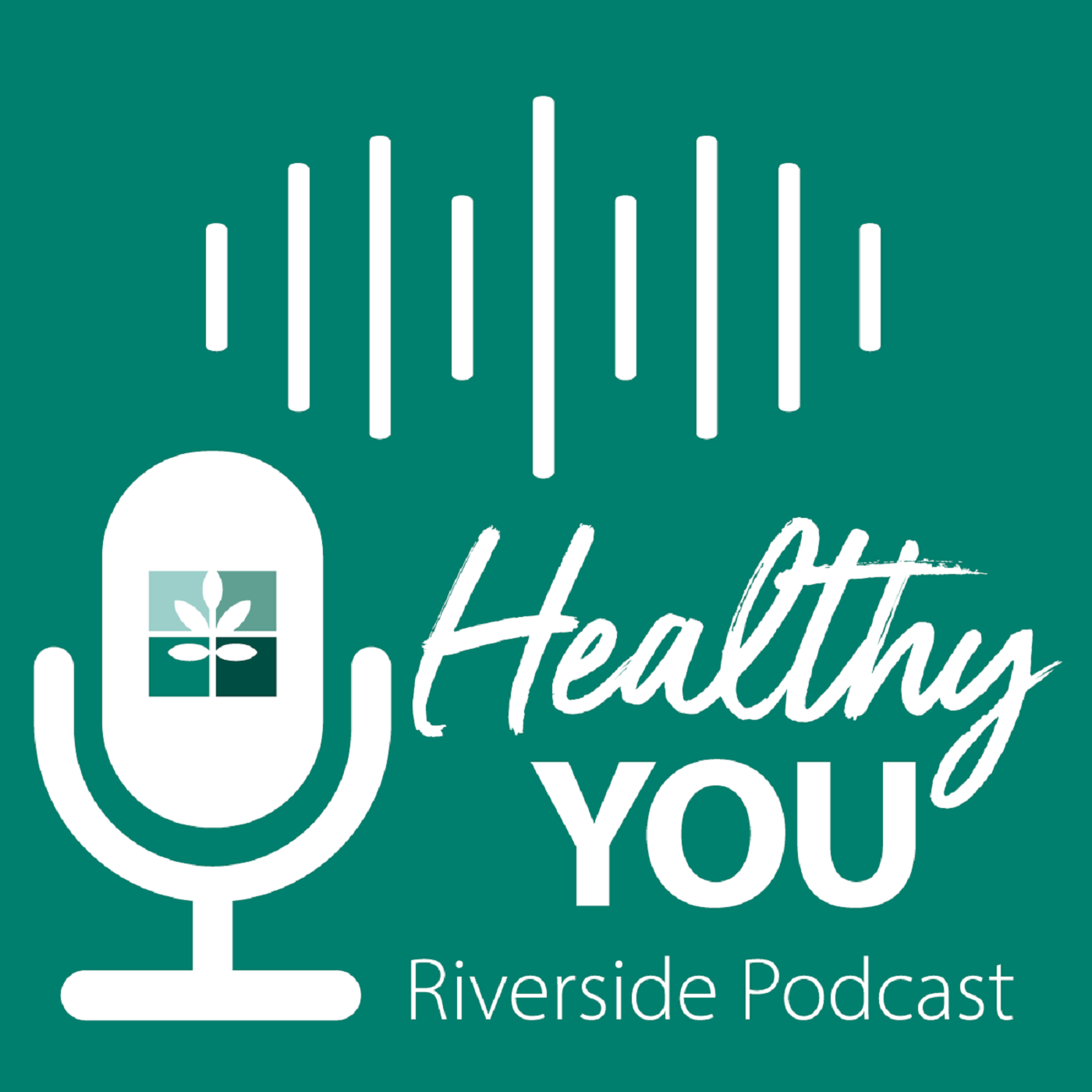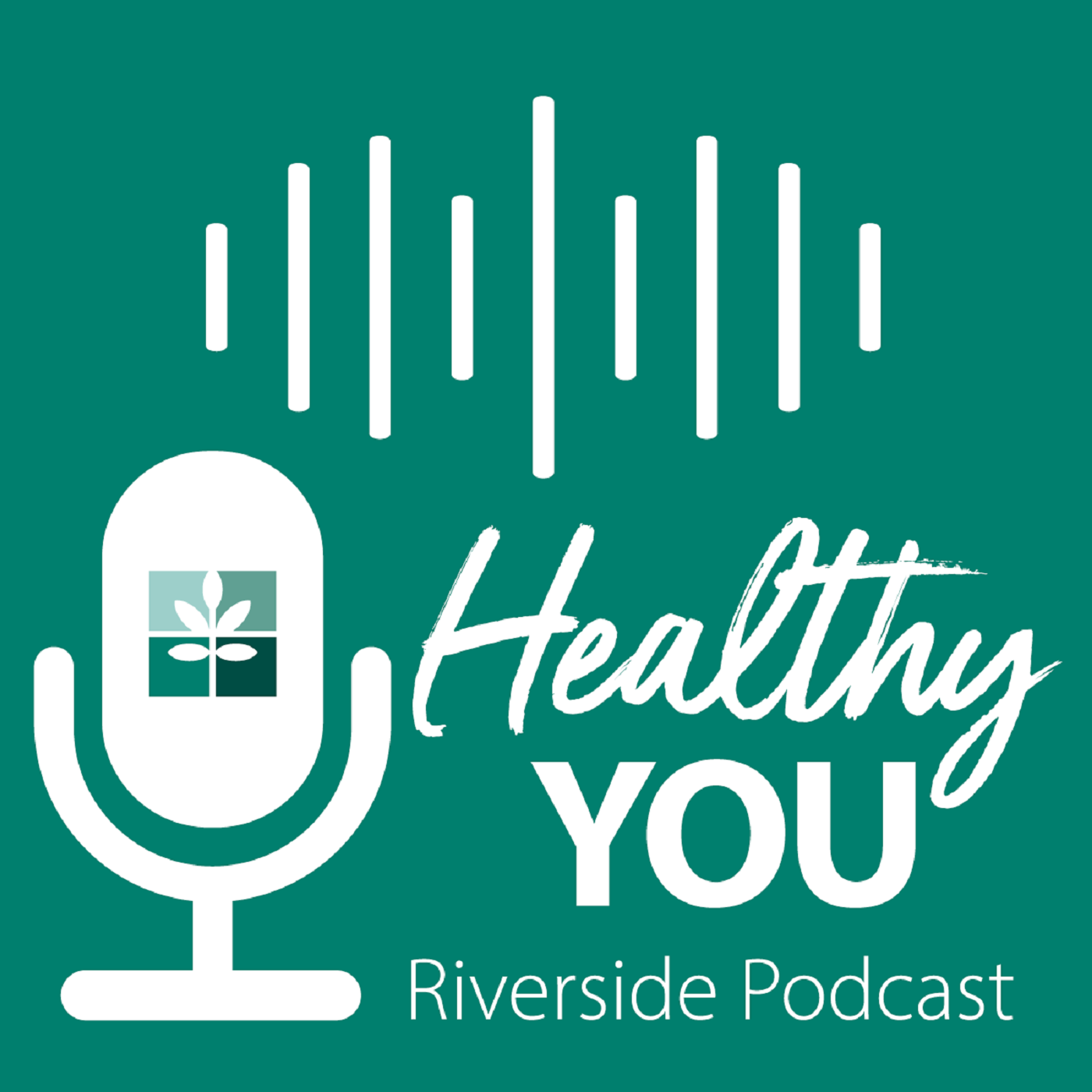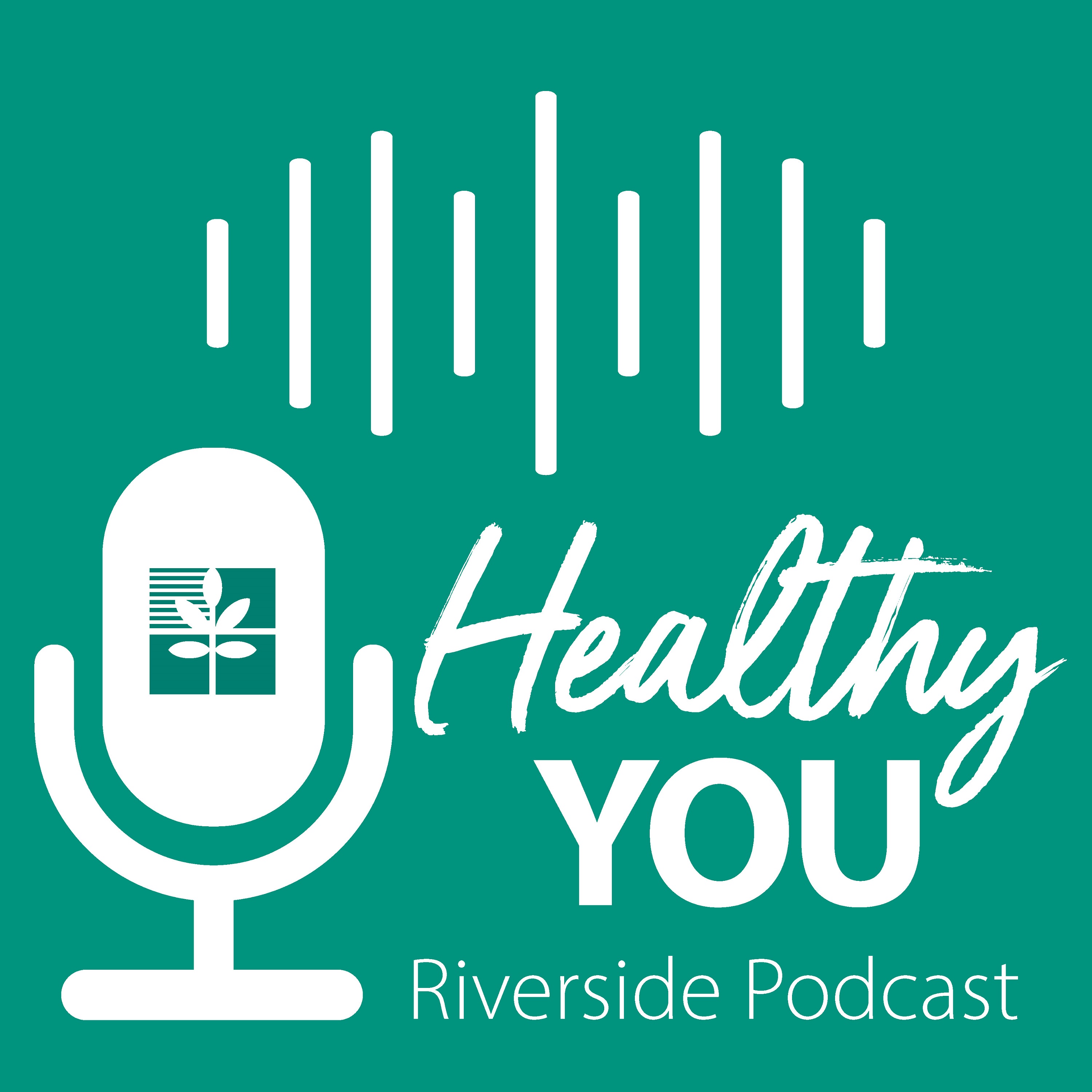Episode Transcript
[00:00:00] Speaker A: From Riverside Health System. This is the Healthy youy Podcast where we talk about a range of health related topics focused on improving your physical and mental health. We chat with our providers, team members, patients and caregivers to learn more about how to maintain a healthy lifestyle and improve overall physical and mental health. So let's dive in to learn more about becoming a healthier you.
I am really excited to have with me today in the healthy youy Studio, Dr. Joel Vorano Mabalott.
Dr. Mabalott is an endocrinologist with Riverside Endocrinology and diabetes specialist. This episode, we're going to be talking about all things thyroid and understanding the gland, the power it has in your body as well.
So welcome again.
[00:00:51] Speaker B: Thank you very much, Frankie, for inviting me here.
[00:00:54] Speaker A: Yes, yes. It's great to have you. I'm your host. I'm Frankie Myers. And today we're shining a light on this tiny gland which is it has a huge job in the body and very powerful. The thyroid. Sitting just below your Adam's apple, this butterfly shaped powerhouse influences everything from your heartbeat to your energy levels and even your mood.
Tell me how you ended up in this field of medicine.
[00:01:21] Speaker B: All right, so I have been an endocrinologist for 25 years.
[00:01:26] Speaker A: Okay.
[00:01:27] Speaker B: And the past 18 years are with Riverside endocrinology and diabetes specialists.
[00:01:33] Speaker A: Wow.
Long time.
Yes, yes, yes.
So did you get exposed to this field after residency or, you know, sometimes you don't always know where you want to specialize.
What drew you to this particular?
[00:01:50] Speaker B: Back in pre med, back in college? Yes, I think I was leaning on the specialty already for some reason. And then I pursued that after my internal medicine residency. Then I went for my endocrinology fellowship in Long Island, New York.
[00:02:07] Speaker A: Oh, wow. Wow. Well, thank you for your commitment to this field. A lot of people may not know I worked for about a year and a half for a pediatric endocrinologist in Columbia, South Carolina, Dr. Frank Boyer. He was connected with USC School of Medicine.
And so I learned a lot about the field as it relates to pediatrics. So great, great little bit of background. According to the American thyroid association, about 20 million Americans have some form of thyroid disease and up to 60% don't know that they have a problem.
Women are five to eight times more likely than men to develop a thyroid condition.
And roughly one in eight women will be affected by the disease in their lifetime.
Dr. Mablot, what do these numbers mean for our community?
[00:03:00] Speaker B: Those are big numbers.
[00:03:01] Speaker A: Yes, they are.
[00:03:03] Speaker B: So that is a lot of patients with thyroid diseases.
Our community Reflects well, those numbers, I would say.
I think thyroid nodules being so common that one out of three people would have at least a tiny nodule is one reason why we have those kind of numbers for a thyroid disorder being undiagnosed.
[00:03:30] Speaker A: Okay, okay. Okay, great. That's great, Great information.
Let's define what the thyroid actually does.
Right.
And why is this small gland so essential? And we don't talk about it like we do the heart or some of the.
The other organs in our body.
[00:03:53] Speaker B: All right, so the thyroid gland, or to simplify, we could just call it the thyroid.
So it produces thyroid hormone. About 80% of what a thyroid produce is T4 or thyroxine, and then the rest is T3 or triodothyronine.
[00:04:16] Speaker A: Okay.
[00:04:17] Speaker B: The thyroid hormone is the one in charge of our body's metabolism, which is like the speed at which our body use energy.
[00:04:28] Speaker A: Yes.
[00:04:29] Speaker B: So normal amounts of thyroid hormone, normal speed. If you have too much, it's fast.
And then if it's less than normal, then it's lower, it's slower.
[00:04:41] Speaker A: Yeah. I tried to blame my weight gain on less than slower, but had no formal diagnosis, unfortunately. So how does a thyroid know when to speed up or to slow down? What is the regulator for that or regulation?
[00:04:56] Speaker B: So when there's a need for the thyroid to produce more thyroid hormone, another tiny gland underneath the brain called the pituitary gland would produce more thyroid stimulating hormone, or TSH, and then with that, more T4 and T3 will be produced.
[00:05:16] Speaker A: Okay, let me ask you, is there a genetic component potentially. So you know, based when they look at your past history of your parents, etc. Is there an association?
[00:05:28] Speaker B: Yes. There are so many thyroid conditions with genetic predisposition.
That's why when you ask for family history.
[00:05:37] Speaker A: Yes.
[00:05:38] Speaker B: Majority of patients would tell off at least a family member with some form of thyroid disorders.
[00:05:44] Speaker A: All right, good stuff. Great information.
Thank you. With so many people potentially living with undiagnosed thyroid condition, it's important to know what signs to look for. Let's talk about some of the common signs and symptoms associated with thyroid thyroid issues.
[00:06:04] Speaker B: All right, so we could start with the condition hypothyroidism or when someone has lack of thyroid hormone. As we talked earlier, if you have less than normal amounts of thyroid hormone, everything is slow.
So you would see a patient with fatigue, weight gain, cold, intolerance.
They would complain of hair and nail problems, constipation, being weak. So things in our body being slow.
Now, the opposite is hyperthyroidism, or if you have too much thyroid hormone in your system.
So everything is fast.
Someone would have palpitations, they would lose weight, they would have heat intolerance, anxiety, tremors.
And then if someone has goiter on a large thyroid or they would have a large nodule, then sometimes you could see it, sometimes you could feel it.
If it's a large thyroid or nodule compressing on the surrounding structures of the thyroid, then someone could have difficulty swallowing, they could have shortness of breath, and sometimes they could complain of pain along the thyroid area.
[00:07:31] Speaker A: Gotcha. Gotcha. That's great stuff.
Many of these signs and symptoms overlap with everyday fatigue.
When should someone talk with someone, their provider, about these symptoms?
[00:07:48] Speaker B: If you have a combination of symptoms that's been lasting for several weeks, those symptoms that we talked earlier, then it should be time to contact your primary care provider so you could be tested.
[00:08:06] Speaker A: Okay, very good, very Good. Thank you, Dr. Mavillot, welcome. Let's walk through how thyroid conditions are actually diagnosed from an imaging perspective.
You talked about the assessment piece.
[00:08:22] Speaker B: So imaging perspective. We use thyroid ultrasound quite frequently.
So if someone has a large thyroid or you suspect there's some growth going on in the thyroid. Thyroid ultrasound is a very good way to find out if someone really has an enlarged thyroid or there are nodules.
If there are suspicious nodules, then we would recommend ultrasound guided fine needle aspiration biopsy to rule out the possibility that it's malignant.
[00:08:55] Speaker A: Okay. Okay.
Dr. Mabilat, walk us through the process. What does an ideal thyroid workup include?
[00:09:05] Speaker B: One good screening test is doing a tsh, a thyroid stimulating hormone.
I would say if you have certain risk factors.
So say if you're 35 years old and over, you have strong family history of hypo or hyperthyroidism, you have symptoms to suggest that you may have the condition, at least a TSH.
And then if the T4 or T3 would be low or elevated, combined with how the TSH is, then we could diagnose it if someone has hyper or hypothyroidism.
So that's to assess if someone has excess or lack of thyroid hormone. And then we talk about doing a thyroid ultrasound if someone has an enlarged thyroid of their suspicious nodules.
[00:10:00] Speaker A: Absolutely.
Dr. Mabilat, do most of your referrals come in from primary care? And we talk a lot about unhealthy you, the importance of having a primary care physician or seeing a doctor or provider routinely so that you can keep up with the things that are going on and the changes going on with your body or just from a disease prevention and health promotion perspective as well.
[00:10:27] Speaker B: Yeah. Most thyroid conditions, particularly hypothyroidism, are easily manageable by primary care providers.
But if it gets difficult to control hypothyroidism, or if someone has hyperthyroidism, thyroid cancer, then, yes, we get referrals from primary care providers to manage the condition. But if it's just hypothyroidism, primary care providers could easily manage the condition.
[00:10:57] Speaker A: Okay, very good. That was very important information for our audience. So next, once diagnosis, what are the common treatment options? And you've talked a little bit about some of those or alluded to those.
[00:11:15] Speaker B: If someone has hypothyroidism or they lack thyroid hormone, then we replace thyroid hormone.
The most common preparation we use the generic name is levothyroxine, which comes in different brands.
So depending on how severe the hypothyroidism is, the dose could vary.
What we do is when we diagnose the hypothyroidism, we'll start the patient on levothyroxine. There's another option also of an older form of thyroid hormone, which is desiccated thyroid.
So we'll put them on a certain dose, check the levels in about four to six weeks.
Included would be TSH and free T4. And then depending on how they feel, if the numbers are in the normal range or reasonable enough, we'll keep them on that dose.
If the levels are right, I would recommend to check thyroid hormone at least twice a year. If adjustments are being done, then do it more often.
For someone with hyperthyroidism, there are at least three options.
One is to start them on a thyroid blocker.
The two thyroid blockers available in the market are methimazole and propyl thiuracil.
One other option is radioactive iodine treatment.
So if it's a large overactive thyroid, then we'll give them radioactive iodine to SAP the overactive thyroid. And eventually after about two to six months, for most patients, they'll become hypothyroid and they'll be started on thyroid hormone replacement.
And then the other option is removal. So we'll have a surgery, remove the overactive thyroid gland.
And because we need thyroid hormone to live, then they'll be on thyroid hormone replacement for the rest of their lives.
[00:13:18] Speaker A: Also, and I do remember from nursing school, so you take the thyroid out, the parathyroids are on top of those. So then you got to worry about calcium. Right. Are you on lifetime calcium after that as well?
[00:13:31] Speaker B: So it's one complication we see on someone who'll have their thyroid removed. And you're right, because of the proximity of the parathyroid glands, they're just sitting behind the thyroid. So sometimes in an effort to remove most of the thyroid tissue, some of the glands or gland or glands will be removed.
And then there's the complication of them developing a condition called hypoparathyroidism. And they'll be on calcium replacement, specialized vitamin D replacement.
So that's one complication we don't want to see for patients we are treating for having an overactive thyroid.
[00:14:13] Speaker A: Okay, very helpful. Are there lifestyle or nutrition tweaks that make medical therapy better?
[00:14:23] Speaker B: Lifestyle?
I'm not quite sure if a certain lifestyle would control a medical condition, but of course, healthy lifestyle, good diet, it.
[00:14:38] Speaker A: Helps with everything, right? Everything else, yeah, for everything, yeah.
[00:14:42] Speaker B: Yes.
[00:14:43] Speaker A: No high blood. You know, all of those things are good overall, Right? Yeah, that's a good point.
All right, so of course, with so much information and misinformation out there, managing the thyroid condition can get quite confusing. Let's take a moment to clear up some common myths, perceptions out there.
[00:15:02] Speaker B: Here we go.
[00:15:04] Speaker A: Yes.
[00:15:06] Speaker B: All right. So one is that dietary modification alone is enough to cure a thyroid disorder. Of course, that's not true. If you lack thyroid hormone, you need thyroid hormone to replace it. If you have an overactive thyroid, then you need a medication to control it. If you have thyroid cancer, we need to remove it.
If you have a large thyroid nodule pressing on the windpipe or the esophagus, we have to remove it.
So no dietary modification can control that.
And then another one is that a person with hyperthyroidism should not be overweight. So that's not true. There are so many factors that could contribute to how our weight would be.
[00:15:50] Speaker A: Yes, yes.
[00:15:52] Speaker B: Here's another one. That if you have weight gain, fatigue and mood swings, that you probably are hypothyroid.
[00:16:01] Speaker A: Right.
[00:16:02] Speaker B: So of course that's not true.
[00:16:04] Speaker A: Also, you could be having a bad day.
[00:16:07] Speaker B: Yes.
And then another misconception is that the older form of thyroid hormone, the desiccated thyroid, is better than levothyrosine.
I would say that's not true for some patients. The older form, the desiccated thyroid, works better or better, better tolerated.
Another misconception is that thyroid conditions are lifelong. Actually, no. Some thyroid conditions are just temporary and of course, some of them are permanent.
And then one other misconception is that over the counter supplements are safe and effective to control a thyroid condition. Of course, simply that's not true.
[00:16:57] Speaker A: Okay, all right, that's great. Information for our viewers, please seek medical advice and attention and recommendations.
[00:17:06] Speaker B: That's a good advice. Yes.
[00:17:07] Speaker A: Don't go buy home remedies or things you hear out there.
All right. Thyroid disorders can impact mood and anxiety. How do you support patients emotionally through this condition? These conditions?
[00:17:19] Speaker B: Well, it is very important for the patients to be aware of the condition that they have.
You discuss with them the pathophysiology or how the condition happened. You discuss treatment options. They should be very much involved with what we'll do and then reasonable expectations of the treatment should be discuss with the patient also.
[00:17:47] Speaker A: Okay, to wrap it up, what three habits can listeners start today to support thyroid health?
[00:17:55] Speaker B: No particular habits I would say could improve a thyroid condition, but I would say for general health. So exercise, eat well, sleep well.
All difficult to do, but that's the advice.
[00:18:12] Speaker A: Just be intentional.
That's what it's about every day. And what's your message to someone who's newly diagnosed who feels overwhelmed with their diagnosis?
[00:18:23] Speaker B: So thyroid disorders are very common.
Just make sure that you have your primary care provider involved.
If the condition is difficult to be managed by the primary care doctor, have a thyroid specialist, an endocrinologist be involved and hopefully we'll do a better job.
[00:18:45] Speaker A: Yes, absolutely. Dr. Maplot, thank you so much for taking time out of your business.
[00:18:50] Speaker B: Thank you very much.
[00:18:51] Speaker A: Talk with us. And to help, just add and provide additional information on this demystifying organ called the thyroid.
If one of our viewers wanted to reach out to you, how could they connect with you?
[00:19:10] Speaker B: You all right? We have offices here in Newport News and Williamsburg, so just look it up. Riverside website, Riverside endocrinology and diabetes specialists.
[00:19:24] Speaker A: Absolutely.
[00:19:24] Speaker B: And we'll try to fit you in.
[00:19:26] Speaker A: Thank you. Thank you again.
[00:19:28] Speaker B: Thank you very much.
[00:19:29] Speaker A: Yes. And thank you to our listeners for joining us today for this episode of the Health the you podcast. If this conversation resonated with you, you please share it with someone you know.
Visit our website Riverside Health Blog for more insight. Until next time, take care.
Thank you for listening to this episode of Healthy Youth. We're so glad you were able to join us today and learn more about this topic. If you would like to explore more, go to riversideonline.com SAM.


